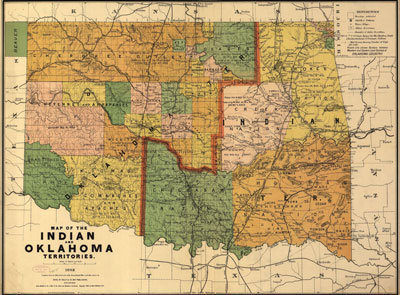
The red line divides the state of Oklahoma and Indian Territory. The map was created in 1892, before statehood. (Library of Congress. http://hdl.loc.gov/loc.gmd/g4021e.ct000224)
Do you have any idea where the Territory was? Outlaws fled there when the law was after them. Judge Parker often called the Hanging Judge handed out verdicts to whites who broke the law. Young couples in Texas got married there when Texas law required a three-day wait, but marriages before statehood between whites had to be recorded in Texas. Texas farmers thought the grass was much greener on the other side of the Red River until they tried farming it. In the drought beginning in 1893 Texas cattlemen drove herds to Big Pasture, good grazing land tribes leased to whites. Land south of the Red River was more fertile but the North side had more oil.
Now do you have an idea where the Territory is? It’s Oklahoma today, but was once known as Indian Territory. Oklahoma and Texas have a lot in common and are very competitive. Don’t try to enjoy State Fair of Texas on Texas-OU weekend or you might get squashed. It’s a coin toss for which state has the worse weather and more tornados. But whatever side of the Red River one resides on, that is that person’s favorite side, no doubt about it.
Early settlers in northeast Texas first located on the north bank of the Red. Shortly thereafter, the Federal government relocated Choctaw Indians there. The whites had to pick up and move across the river.
At the very onset of the Civil War the Eleventh Texas Cavalry crossed the Red to attempt to convince Native Americans to fight for the Confederacy. Some did and others didn’t. Amazingly the Southern Creek tribe joined the Union Army while Northern Creeks sided with Confederates.
After the Civil War until sometime in the 1920s, outlaws here in Texas fled into Oklahoma. Gunslingers, train robbers, forgers and petty thieves hid out in the under populated areas. At that time there were no dams along the Red River to control floods and provide communities with water. Would-be felons headed their horse north into a haven of freedom, they hoped.
Not all folks moving into Indian Territory were criminals. My great-grandfather and family, his mother, and brother settled in Jefferson County Indian Territory around 1890. My great-grandfather is supposed to have run the ferry between Red River Station in Texas and the landing in the Chickasaw Nation. His brother Oscar supposedly visited Judge Parker about a load of stolen goods. Federal court records say Oscar was a witness but the family feared his was the criminal.
And who can forget the Okies in Grapes of Wrath? They farmed in the Oklahoma Panhandle under the assumption that plowed land would bring rain. Only by a fluke in weather did that work the first few years they tried growing wheat. Then the drought that brought the Dust Bowl arrived. Movies and newsreels remind us of the poverty-stricken people who lost everything only to be ostracized in California.
But Oklahoma is a great place. They tell stories about us Texans the same way we talk about them down here.
